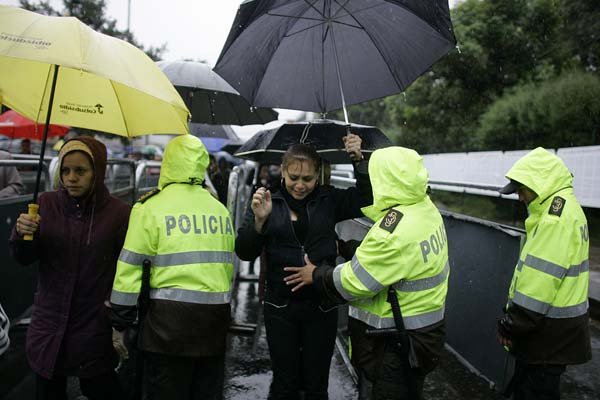BOGOTA, Colombia — A former defense minister from a powerful political clan who oversaw a major weakening of leftist rebels won Colombia’s presidency Sunday, routing an eccentric outsider in a runoff.
The victory for Juan Manuel Santos, a 58-year-old economist and three-time government minister, was a ringing endorsement of outgoing conservative President Alvaro Uribe, whose U.S.-backed security policies he helped craft and promised to continue.
With nearly all polling stations reporting, Santos had 69 percent of the vote against 28 percent for former two time Bogota Mayor Antanas Mockus. It was largest margin of victory in a presidential vote in modern Colombian history, said Carlos Ariel Sanchez, director of the national electoral council.
More than 3 percent of voters tendered protest ballots, indicating dissatisfaction with both candidates.
Mockus ran an anti-corruption campaign atop a fledgling Green Party that many Colombians considered naive if well intentioned. But after catapulting into early contention, he stumbled with a series of gaffes that had Colombians questioning his ability to run a country still mired in a half-century-old conflict.
Violence marked Sunday’s vote as seven police officers and three soldiers were killed in separate attacks blamed on leftist rebels.
The police were killed when a roadside bomb ripped apart their truck on a routine patrol in Colombia’s northeast, authorities said, while the soldiers died in an ambush on an army patrol carrying election material to a town in the eastern plains. Defense Minister Gabriel Silva blamed the Revolutionary Armed Forces of Colombia for the ambush, and the smaller National Liberation Army was believed behind the bombing.
Independent electoral observers said rebels burned ballots and otherwise disturbed voting in eight of Colombia’s 32 states.
In the May 30 first round, Santos fell just shy of the simple majority needed for victory.His margin of victory Sunday was superior to the 62 percent garnered by Uribe in his 2006 re-election, and Mockus won in just one state, Putumayo, on Colombia’s southern border.
In his concession speech, Mockus said the election marked the consolidation in Colombia of “a new, independent political force, the Green Party,” which he promised would “support the good and oppose the bad” in Santos’ government.
“Today we begin to change Colombia,” he said to the shouted acclaim of supporters at a campaign headquarters festooned with sunflowers and green.
The Greens won their first seats in Congress in March 14 legislative elections. They will have five members in the 102-seat Senate that takes office July 20 and will be dominated by Santos’ allies. Santos takes office Aug. 7.
The persistence of the rebel threat was a central issue in the campaign.
“Security. Security,” said Bogota clothing factory owner Humberto Botero, 52, explaining his vote for Santos. “He’s a statesman. He’s someone who knows the country, who knows how to surround himself with talent.”
Santos won the endorsement of most of the country’s political establishment after the first round. He promised to build on the conservative Uribe’s security gains, but also vowed to help the poor in a nation notorious for income inequality where more than two in five of its 44 million people live on less than $2 a day.
Those who voted for Mockus, a former university rector and son of Lithuanian immigrants, praised his refreshing integrity and promise to rid Colombia of the endemic corruption he says is at the root of its seemingly endless violence.
“As he says, he’s on the side of culture and education. Those things are important for me because they are what we lack at the moment,” said Elsa Torres, a 66-year-old homemaker who voted in Bogota.
Santos, a University of Kansas graduate, was making his first run for elected office and insisted he could trim Colombia’s deficit without raising taxes.
Santos is a great-nephew of Colombia’s Liberal party president in 1938-42, Eduardo Santos, whose family long ran the country’s leading newspaper, El Tiempo.
As Uribe’s defense minister in 2006-09, Santos helped knock the wind out of the rebels.
Two members of the rebels’ seven-man ruling secretariat were killed during his tenure, and he oversaw the bloodless 2008 ruse that rescued former presidential candidate Ingrid Betancourt, three U.S. military contractors and 11 others from long captivity with the rebels.
Santos also clashed often with leftist Presidents Hugo Chavez of Venezuela and Rafael Correa of Ecuador.
Last month, a judge in Ecuador ordered Santos’ arrest for authorizing the 2008 cross-border raid on a rebel base inside Colombia’s southern neighbor that killed the rebel group’s No. 2 commander, Raul Reyes.
Santos called the arrest warrant absurd because the Colombian state - not he individually - carried out the raid.
He said it wouldn’t prevent him from visiting Ecuador as president if invited. Further, Santos said he would invite Chavez and the Venezuelan leader’s leftist allies to his Aug. 7 inauguration if he won the presidency.
“I want good relations with all our neighbors,” Santos said. Information for this article was contributed by Cesar Garcia and Nancy Lopez of The Associated Press.
Front Section, Pages 2 on 06/21/2010
